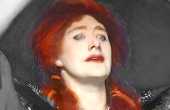Laurika Nxumalo
Laurika is freelance writer, columnist, and communication sciences student. Her favourite quote is, “Be who God meant you to be and you will set the world on fire.”
Junior Contributor III
- Lurker
- Sharp-Eyed Citizen
- ?
- Articles
2 - Featured
2 - Comments
22
- Ext. Comments
6 - Processed
7 - Revisions
5
- Topics
4 - Topics Taken
2 - Notes
4
- Topics Proc.
4 - Topics Rev.
1
- Points
361 - Rank
X - Score
196
Latest Articles
Latest Topics
“Unsex me here” - Lady Macbeth as a Disruptive Force in MacbethIn ‘Macbeth’, Shakespeare substantially emphasizes the male-female relationship and gender dynamics. Shakespeare shows the relationship between gender and power which can be related to the patriarchal discourse of early modern England. He portrays women as major determinants in men’s actions. Men are portrayed as strong willed and courageous, but a female character such as Lady Macbeth is also given a ruthless and power-hungry personality, which was, in that era, typically associated with masculinity. She is a strong character who is deeply ambitious; her role in ‘Macbeth’ becomes important because it further explains Shakespeare’s presentation of women characters. Lady Macbeth is associated with supernatural subversion as well as sexual temptation – the question is, how did she use her femininity to disrupt her environment and what does her character teach?
|
The Prediction of the Future Through ArtIn the 19th century, Oscar Wilde wrote in ‘The Decay of Lying’ that, "Life imitates art far more than art imitates life… results not merely from life’s imitative instinct, but from the fact that the self-conscious aim of life is to find expression, and that art offers it certain beautiful forms through which it may realize that energy." According to Wilde, what people find in life and nature is actually not there, but what people find is what artists have taught them to find through art. So, does life imitate art or does art imitate life? In light of these questions, is it possible for art to predict the future? Which artwork by which artist do you think predicted the future?
|
'Beauty and the Beast' - A Tale That Foretold The Life Of Today‘Beauty and the Beast’ is a tale that is different from the popular fairy tales; it has a peculiar take on psychological, socio-historical, religious and feminist approaches. Unlike other well-known fairy tales that were written or told by an unknown storyteller, the tale of Beauty and the Beast is an original literary story written in a specific historical and political moment by a female writer, Madame Leprince De Beaumont who was also a governess. The story of ‘Beauty and the Beast’ has been interpreted in different ways. Some claim that it is a love story that teaches us modesty and introduces the healing power of love. Others claim that it is a tale about female empowerment growing – the awakening of a woman and her psychological and sexual maturation. Some see abuse in a romanticized hostage situation – the Beast is seen as an egocentric sociopath who keeps Beauty as his hostage while she loses touch with reality and falls in love with him; an example of Stockholm syndrome. Oftentimes, ‘Beauty and the Beast’ is interpreted as a story about a conflict of genders and a fight for domination. Like in all narratives involving love – any objectivity is lost; bad becomes good, ugly turns into beautiful, violence becomes tenderness and kindness, etc. ‘Beauty and the Beast’ and its motives appeals to modern society; it narrates our hidden wild side to us. Societal norms have civilized our wildness, but this suppressed wildness constantly finds a way of coming out in our social and intimate relationships. ‘Beauty and the Beast’ also speaks about ‘otherness’. How hard is it be different? What does it mean to be a beast – is it something that one becomes while living or is one born with it? What is beauty? What is pure and what is dirty? What is pleasure and does it have more value in the society or should it be punishable? Can beauty and wildness co-exist?
|
'The Second Sex' By Simone de Beuavoire: Woman As Other‘The Second Sex’ ultimately serves as the most eloquent, sophisticated and detailed synopsis of the patriarchal society and how it oppresses women. As Simone illustrates it is the amalgamation of destiny, history and myth which create “bird cage of oppression”. The reasoning that this oppressive structure has been created is muddled; however, there are three major considerations as to why it has been created: 1) out of necessity, 2) for control, 3) as a means of transcendence. Control has been the epitome of the patriarchal society. Men have sought to dominate their environment and as part of that there exists women. Arguably women have been the greatest challenge to men’s goal of control. Women have stood in opposition to men even when they are bound by the institutions of men. It is because of this dichotomy between menn and women which have strengthened the resolve of menn and their pursuit of control. As history illustrates men have always sought to place women as the objects of their reality and through doing so men have thought that they could control women like they control the tools they create. However, this has not worked in the favor of men and the rise of feminism bears witness.
|
Latest Comments
| Exploring the Sensual Power of Dance in Cinema | |
Shakespeare wanted to highlight what guilt does to the human mind | Lady Macbeth: Unravelling the Complexities of Shakespeare's Iconic Character |
Shakespeare wanted to highlight what guilt does to the human mind | Lady Macbeth: Unravelling the Complexities of Shakespeare's Iconic Character |
She came up with the plans and Macbeth implemented them through her manipulation | Lady Macbeth: Unravelling the Complexities of Shakespeare's Iconic Character |
Well, I concentrated more on Lady Macbeth not much on Macbeth | Lady Macbeth: Unravelling the Complexities of Shakespeare's Iconic Character |
Thanks for reading the article | Iago - The Perfect Villain |
Thanks | Iago - The Perfect Villain |
Thank you for reading the article | Iago - The Perfect Villain |


Dance, just like music, is a universal language. By the way, I love the imagery in your post